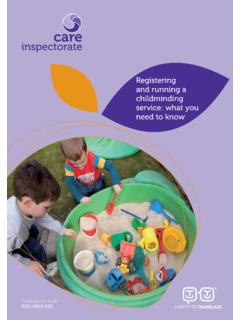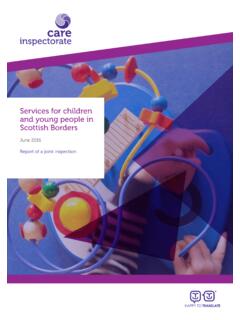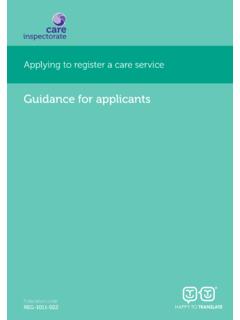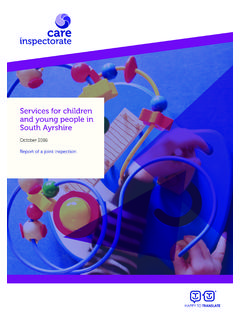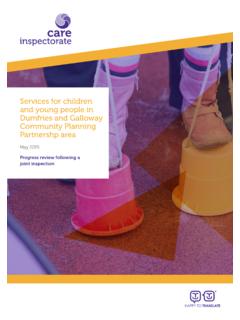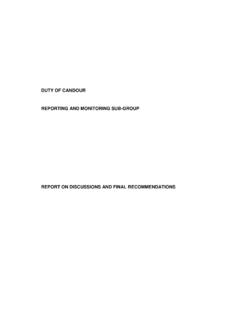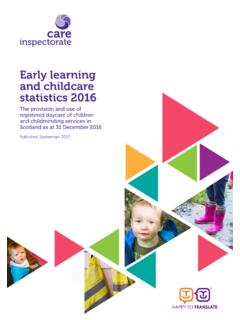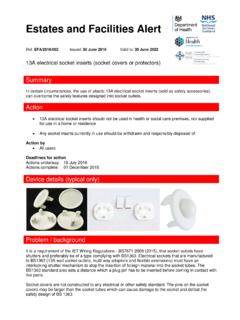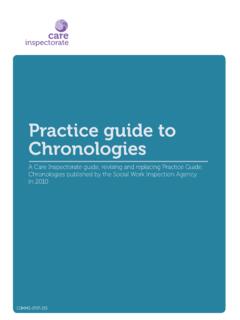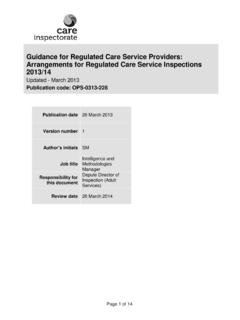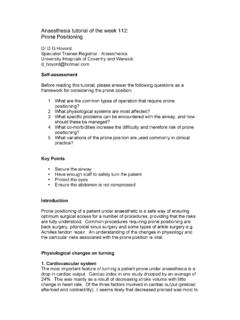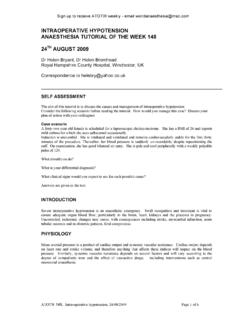Transcription of Prompting, assisting and administration of medication in a ...
1 Page 1 of 6 prompting , assisting and administration of medication in a care setting: guidance for professionals Publication date: March 2015 Publication code HCR-0315-092 Page 2 of 6 Background Any care service provision should be based on the desired outcomes of the person who uses the service. This may require an assessment of their existing medication capabilities and needs. This assessment is central to the success of managing medicines in the care setting. It should be made with the input of the person themselves (or a suitable welfare proxy if required) and lead to a plan of care that details the agreed roles and responsibilities of care workers, the person themselves and/or any family members involved. Various people may do the assessment, including members of the primary health care team, social work staff, or independent care providers.
2 Most assessments of medication capabilities cover a person s comprehension of their medicines, as well as motivation and physical ability to take them. It should also look at any help needed with ordering and collecting prescriptions and so on. Any assessment tool should be quick and easy to use, while still being comprehensive enough to identify needs. As part of this process, we* have agreed that guidance defining medication roles is needed to improve consistency of practice in care services. We have agreed the following definitions, which are consistent with those used by the Care Inspectorate and in agreement with the definitions in SQA Higher National Unit (F9D9 34) administration of medication . We hope that this national guidance will help services develop local medication policies. *We are the Care Inspectorate, and a Royal Pharmaceutical Society (Scotland) and Social Work Scotland working group.
3 Page 3 of 6 Guidance An assessment of a person s capabilities may show that they do not need any help from care staff with medicines. For example, when it is clear that a person may occasionally forget to take his or her medicine, simple approaches such as the person taking the medicine when he or she gets up or goes to bed, or with meals, or setting a timer may help. The assessment could also show that the person is essentially able to retain control of his or her medicines but needs assistance with simple mechanical tasks such as opening bottles or requesting repeat prescriptions from the GP, or an occasional verbal reminder from the care worker to take medicines. Care staff may be required to prompt, assist or administer medicines. Staff should be clear of the difference between these roles. prompting The dictionary definition of prompting is: the action of saying something to persuade, encourage or remind someone to do or say something.
4 prompting of medication is reminding a person of the time and asking if they have or are going to take their medicines. The person is still in control of their medicines, and may decide not to take them or to take them later. prompting can be useful when a person knows what medicines to take and how to take them, but may simply forget the time. Improving Practice Point If carers are expected to prompt a person to take medicines, they need to know what time(s) of the day to do this. The Care Inspectorate is aware of examples where people were prompted to take all of their medicines irrespective of whether they were due. This resulted in one case of a person taking Warfarin three times a day instead of once a day, with serious consequences. assisting A person may be able to retain control of his or her medicines but need assistance with simple mechanical tasks.
5 assisting with medicines can include: ordering repeat prescriptions from the GP s surgery picking up prescriptions from the GP s surgery collecting dispensed medicines from the pharmacy bringing packs of medicines to a person at their request so that the person can take the medicines opening bottles or packaging, including Multi-compartmental Compliance Aids (see definition at end of document*) at the request and direction of the person who is going to take the medicine reading labels and checking the time at the request of the person who is going to take the medicine Page 4 of 6 ensuring the individual has a drink to take with his or her medication As with prompting above, the person is assessed as being able to self-medicate, and is in control of their medicines. This independence should be supported. A pharmacist may be able to offer options for support in self-managing medicines based on the identified needs of the person requiring care.
6 administration If a person cannot take responsibility for managing their medication , care staff may be needed to ensure that the person gets offered or is given: the correct medication at the correct time in the correct way This must be considered medicines administration . administration of medicines is one, all, or a combination of the care worker doing the following: deciding which medicine(s) have to be taken or applied and when this should be done being responsible for selecting the medicines giving a person medicines to swallow, apply or inhale, where the person receiving them does not have the capacity to know what the medicine is for or identify it giving medicines (even at the request of the person receiving care) where a degree of skill is required to be exercised by the care worker to ensure it is given in the correct way Care providers must ensure that care workers are trained in medicines administration before these core roles can be done.
7 They should also have a system to regularly assess the competency of care staff in their role. The level of support a person requires may vary, with the person taking more or less responsibility over time depending on their health and capability, and with the medicine itself. For example, a person may self-administer an inhaler, require care staff to given tablets and community nursing staff to given an injection. Medicine roles not normally undertaken by care staff Sometimes a person needs medicines administered which the care workers are not normally trained to give, such as medicines that use specialist or invasive techniques, for example: Rectal administration of suppositories Insulin given via pre-filled PEN devices administration through a Percutaneous Endoscopic Gastrostomy (PEG) tube These roles will normally be done by trained healthcare staff.
8 However, there may be occasions where it would be better for a trained care worker to given such Page 5 of 6 medicines rather than wait for a registered nurse, doctor or paramedic to give such important treatment. The important issues to consider are: The person (or their welfare proxy if appropriate) consents to a care worker giving this treatment The care worker(s) agree and are trained to do this role Clear roles and responsibilities are agreed by all those involved in providing care * The Royal Pharmaceutical Society defines a Multi-compartment Compliance Aid (MCA) as a repackaging system for solid dosage form medicines, such as tablets and capsules, where the medicines are removed from manufacturer s original packaging and repackaged into the MCA. For the purposes of this document, this definition of an MCA would include repackaging systems such as monitored dosage systems (MDS) and daily dose reminders.
9 Some new MCA systems are now marketed as being able to accommodate liquid dosage forms. MCAs exist as both sealed and unsealed systems. This document was produced with help from a Royal Pharmaceutical Society (Scotland) and Social Work Scotland working group which involved representatives from: Social Work Scotland Royal Pharmaceutical Society (Scotland) Care Inspectorate Scottish Social Services Council Royal College of Nursing Scottish Care NHS. Page 6 of 6 Headquarters Care Inspectorate Compass House 11 Riverside Drive Dundee DD1 4NY web: email: telephone: 0845 600 9527 @careinspect Other languages and formats Copyright of Care Inspectorate 2015
